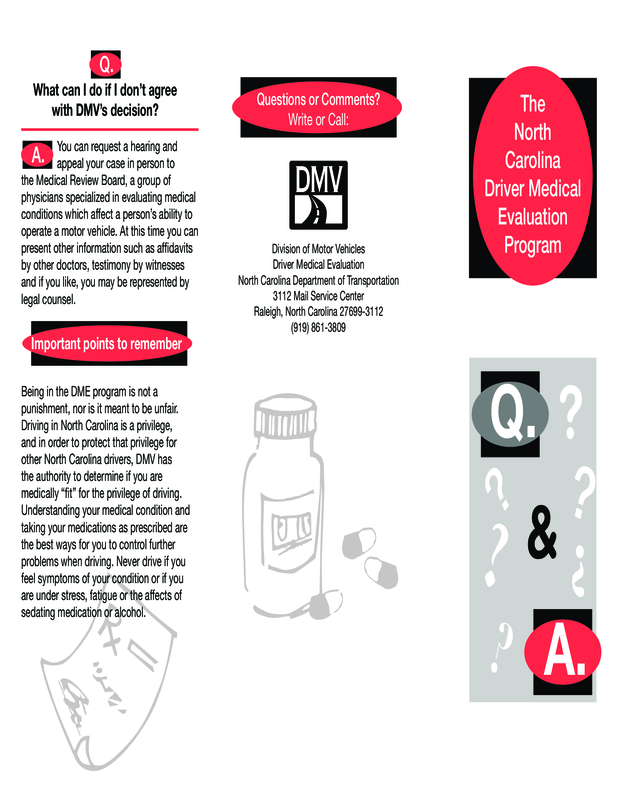Fillable Printable Medical Evaluation Brochure
Fillable Printable Medical Evaluation Brochure

Medical Evaluation Brochure

Q.
A.
&
?
?
?
?
?
?
The
North
Carolina
Driver Medical
Evaluation
Program
Questions or Comments?
Write or Call:
Division of Motor Vehicles
Driver Medical Evaluation
North Carolina Department of Transportation
3112 Mail Service Center
Raleigh, North Carolina 27699-3112
(919) 861-3809
Q.
What can I do if I don’t agree
with DMV’s decision?
You can request a hearing and
appeal your case in person to
the Medical Review Board, a group of
physicians specialized in evaluating medical
conditions which affect a person’s ability to
operate a motor vehicle. At this time you can
present other information such as affidavits
by other doctors, testimony by witnesses
and if you like, you may be represented by
legal counsel.
Important points to remember
Being in the DME program is not a
punishment, nor is it meant to be unfair.
Driving in North Carolina is a privilege,
and in order to protect that privilege for
other North Carolina drivers, DMV has
the authority to determine if you are
medically “fit” for the privilege of driving.
Understanding your medical condition and
taking your medications as prescribed are
the best ways for you to control further
problems when driving. Never drive if you
feel symptoms of your condition or if you
are under stress, fatigue or the affects of
sedating medication or alcohol.

Q.
What is the N.C. Driver
Medical Evaluation Program?
The Driver Medical Evaluation
(DME) program is administered
by the Division of Motor Vehicles (DMV),
with medical counsel and individual case
recommendations provided by physicians
and physician extenders within the Highway
Safety Scientific Services Section of the
N.C. Department of Health and Human
Services (DHHS). Drivers can be referred
to DMV by concerned physicians, family
members, driver license examiners and
law enforcement officers. As a driver,
you may be asked to have your personal
physician provide information on your
medical condition for review by the medical
professionals at DHHS and final licensing
decision by DMV.
Q.
Why are certain medical
conditions important to DMV?
Injury is one of the leading causes
of death in the United States, and
most injury deaths result from motor vehicle
accidents. In 2008, there were 214,226
vehicular crashes with 112,348 injuries and
1,448 deaths across North Carolina. Medical
conditions which affect a person’s ability to
drive account for about half of all crashes
resulting in serious injury or death. Because
of this, all 50 states have chosen to restrict
or revoke driver licenses on the basis of
certain medical conditions by means of a
DME program.
Q.
What medical conditions
are important to DMV?
DMV and DHHS are concerned
about your safety if you are
experiencing medical problems while driving
that put you at risk for a motor vehicle
crash. In addition, DMV is concerned about
the safety of other drivers on the road if you
have a motor vehicle crash. DMV needs
to know if you are experiencing medical
problems such as:
q seizures;
q diabetes or blood sugar problems
with loss of consciousness spells;
q blackouts;
q visual problems
(such as cataracts or glaucoma);
q neuromuscular disorders
(such as Parkinson’s disease or
multiple sclerosis);
q sleep disorders (such as narcolepsy);
q serious respiratory conditions
requiring oxygen;
q heart problems (such as irregular
rhythms and uncontrolled high
blood pressure);
q a recent stroke;
q dementia (such as Alzheimer’s);
q mental illnesses (such as
schizophrenia); and/or
q substance abuse disorders
(such as alcoholism)
Q.
Will I automatically lose my
driver license when I get put
on the DME program?
No, in most cases while you are
being evaluated by your physician,
you may continue driving as usual. After
your doctor completes the DMV forms,
DMV may choose to restrict your driving
privileges to certain speeds, distances or
certain times of day to protect you and other
drivers around you, or they may decide
you cannot operate a motor vehicle until
your medical condition improves. They
may require you to have another medical
report form completed by your physician in
six months to five years later to make sure
your medical condition is being controlled in
regards to driving.
Q.
How can I be released from the
medical program?
A medical evaluation may indicate
that your medical condition has
improved, or been brought under control,
to the point that you can safely operate a
motor vehicle. Certain medical conditions
have key factors that medical evaluators
review to determine whether the customer
should be released from the program. In
these circumstances, you may be released
from the program, at which point you may
renew your license like any other North
Carolina Driver.



